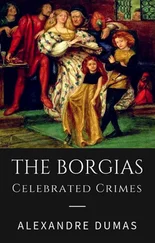At the time of Juan’s murder, however, Giovanni was not in Rome. The alliance between the Borgias and Milan, which had seemed such an excellent idea three years before, had now lost its appeal, and the pope was determined to end it. Threatened and taunted by the Borgia brothers, fearful for his very life, and worried that he might be obliged to repay the 31,000 ducats he had received as Lucrezia’s dowry, the lacklustre Giovanni had fled Rome on Good Friday, March 24, for Pesaro. His fears had grown when, after begging Lucrezia to join him, she — encouraged by both Cesare and the pope — had refused to do so. These fears had been realized at the end of May, a fortnight before Juan’s brutal murder, when Alexander VI’s lawyer had arrived in Pesaro to serve him with a writ for divorce.
At first it had been thought that since Lucrezia’s first betrothal to Gasparo di Procida, the Count of Aversa, had not been formally dissolved at the time of her marriage to Sforza, it would be possible to use these grounds to claim that the marriage was invalid. But this weak excuse proved unacceptable to the wily lawyers involved in the case. So it was decided instead to argue that the marriage, which had taken place in 1493 when Lucrezia was just thirteen years old, had never been consummated, thus leaving her a virgin and free to take another husband more to her father’s political taste.
Lucrezia duly signed a declaration to the effect that ‘after three years of marriage… without sexual relations or carnal knowledge, she was prepared to swear on oath to this and to submit herself to the examination of midwives.’ Alexander VI now insisted that Giovanni make a public declaration that he was impotent, a humiliating prospect and a cruel one.
The unfortunate Giovanni was understandably furious, dismissing the allegation as absurd. He was far from impotent, he protested; he had, he insisted, made love to his wife on countless occasions. Moreover, he pointed out that his first wife had died in the course of giving birth to their child. Finally he approached his uncle Ludovico Sforza for help, but the duke did not take him seriously. He suggested Giovanni should prove his virility with Lucrezia, somewhere outside Rome, with witnesses who could observe the event; or a public demonstration could be arranged with some complaisant lady in Milan, with the papal legate, the cardinal of Monreale, who was one of Alexander VI’s nephews, as a witness.
Giovanni now declared that the pope wanted to get him out of the way so that he could enjoy his daughter’s body more conveniently himself. Moreover, he hinted that while he had not been allowed to share a bed with Lucrezia, now aged seventeen, both her father and her brother Cesare had done so. The rumours of incest, a sin as offensive then as it is now, spread like wildfire through Rome and all of Italy. Born out of Giovanni’s desire for revenge on the family who were taunting him so unfairly, the story stuck.
Many who saw Lucrezia in public, smiling in the company of her adored and adoring family, found the sensational rumours easy to believe, as they did when the pope left her in charge of papal affairs while he was absent from Rome. Yet it was unusual for a daughter to be given this responsibility, though not because she was a lady — the rulers of Italy’s courts regularly left their wives in charge of their affairs while they were fighting, earning their livings as mercenary soldiers, and the pope was doing no more than leaving the reins of power in the hands of the person upon whose loyalty he could rely utterly. And those who saw her in the circle of her household found the persistent talk of incest difficult to credit. She seemed too demure, too innocent.
Cesare, meanwhile, had official duties to perform. A week before Juan’s assassination, the pope had nominated his son, still a few months short of his twenty-second birthday, to the prestigious position of papal legate ‘to anoint and crown the most serene Federigo of Aragon’ as king of Naples. He arrived in Capua, where the coronation was to take place, in good time for the event, which was planned for August 6, 1497, entering the city with an imposing cavalcade that included seven hundred horses as well as numerous servants, guards, prelates, and a straggling crowd of camp followers. Unfortunately he was suddenly taken ill soon after his arrival, and the coronation had to be postponed. He recovered quickly, however, from this illness, which was rumoured to be some sort of venereal complaint, and on August 11, gorgeously attired in red velvet and cloth-of-gold, he was carried in one of his father’s papal chairs to the cathedral, where he played his part in the delayed ceremony with dignified composure.
Cesare obviously enjoyed his stay in Capua and Naples, where he walked about the city in his splendid clothes, clearly relishing the attentions of an admiring and envious populace; and, so it was said, casting lascivious eyes on the daughter of the Conte d’Aliffe, on whom he spent the enormous sum of 200,000 ducats with a careless extravagance that had by now become customary. He fell ill again, soon after his return to Rome, and this time the gossips were quick to identify his complaint as syphilis, the French disease, so Isabella d’Este was informed by her agent, Donato de’ Preti, who wrote to her from Rome to say that ‘Monsignor of Valencia has returned from Naples after crowning King Federigo and he is now sick with the morbo gallico .’ Cesare’s personal physician, Gaspar Torella, would gain enough experience of the disease to write a treatise on it, which he dedicated to his patient.
Cesare had returned to Rome on September 5 and had ridden directly to the Vatican, where he and his father spent several hours closeted in private discussion. While in Naples, Cesare had persuaded King Federigo to make an offer of a new bridegroom for Lucrezia, in the shape of Alfonso of Aragon, the Duke of Bisceglie. This amiable and handsome eighteen-year-old youth was Sancia’s brother, and though he was, like her, illegitimate, this offer to reinforce the links between Rome and the royal house of Naples, not to mention Spain, was greeted by the pope with enthusiasm.
More complicated, however, was the issue of Cesare’s own future. With Juan dead and the fifteen-year-old Jofrè showing no signs of fathering an heir, it was up to him to secure the future of the Borgia dynasty, something he could not do while still a cardinal. Moreover, although his father was hale and hearty, he was now approaching his sixty-seventh birthday, and time was not on their side. Cesare himself was eager to concentrate upon ‘warlike undertakings’ and to take over Juan’s position as commander of the papal armies, but the pope advised caution and the need to find him an appropriate wife before making any rash decisions.
The choice of a wife for Cesare, indeed, had quickly become the talk of Rome. One rumour had it that Sancia was prepared to overlook her suspicions of Cesare’s involvement in his brother’s murder and marry him, while her young husband, Jofrè, would be appointed a cardinal in his place. It was soon clear, however, that both the pope and Cesare had more ambitious plans, and that while he was in Naples, Cesare had approached King Federigo about the possibility of arranging a marriage between himself and the king’s daughter, Carlotta of Aragon, who was currently living in France at the court of the French queen Anne of Brittany.
King Federigo might have been prepared to offer the illegitimate Alfonso as bridegroom for Lucrezia, but he fought shy of agreeing to a marriage between his own legitimate daughter and the licentious, power-hungry Cesare, who clearly had an eye on the Neapolitan throne. Anxious not to offend the pope, Federigo temporized: ‘It seems to me,’ he was reported by the Venetian ambassador to have said, ‘that the son of a pope, who is also a cardinal, is not the ideal person to marry my daughter. If the Pope can make it possible for a cardinal to marry and keep his hat, I’ll think about giving him my daughter.’ Nor was his daughter happy with the proposed match; not only was Carlotta in love with a Breton nobleman, but she was also determined not to marry ‘a priest who was the son of a priest.’
Читать дальше











